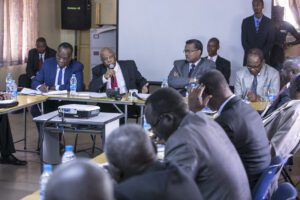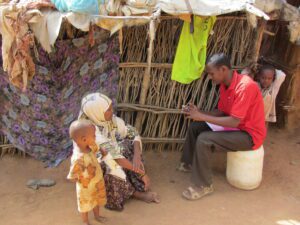1. Introduction
In today’s fast-paced world, data has become the cornerstone of effective decision-making. Businesses, NGOs, and government institutions are increasingly relying on research consults in Uganda to navigate complex challenges, optimize operations, and drive sustainable growth. Research consultation services provide essential insights that enable organizations to make informed, data-driven choices that lead to measurable success.
Uganda has witnessed significant advancements in research methodologies, with consultancies offering expertise in various domains such as market analysis, social impact assessment, and policy evaluation. Whether you’re an entrepreneur looking to understand consumer behavior, an NGO assessing program impact, or a government agency shaping policies, research consults in Uganda offer valuable support in achieving your objectives.
2. What Are Research Consults?
Research consults refer to professional services that provide expert guidance in conducting research, analyzing data, and generating actionable insights. These services help organizations collect, interpret, and utilize data to make informed decisions.
In Uganda, research consultancies play a crucial role in guiding stakeholders across various sectors. These experts design research frameworks, execute data collection, and present findings in ways that facilitate evidence-based decision-making. Whether qualitative, quantitative, or mixed-methods research, consulting firms tailor their approaches to meet the unique needs of their clients.
Key aspects of research consults in Uganda include:
- Data Collection & Analysis: Gathering relevant information from surveys, focus groups, and secondary sources.
- Market and Industry Research: Helping businesses understand trends, consumer behavior, and competition.
- Policy & Social Research: Assisting government bodies and NGOs in designing impactful policies and programs.
3. Importance of Research Consults in Uganda
The role of research consults in Uganda extends far beyond data collection. They serve as a bridge between raw information and strategic decision-making. Here’s why they matter:
- Enhancing Strategic Planning: Businesses and organizations use research insights to align their strategies with market demands and societal needs.
- Supporting Policy Development: Government agencies rely on data-driven insights to formulate policies that address pressing economic, social, and environmental issues.
- Driving Business Growth and Innovation: Entrepreneurs and corporate leaders leverage research to identify opportunities, mitigate risks, and stay ahead of competitors.
For Uganda’s rapidly evolving economy, access to reliable research consults ensures that decisions are based on facts rather than assumptions, leading to sustainable progress.
4. Key Research Methodologies Used in Uganda
Research consults in Uganda employ various methodologies to deliver accurate and relevant insights. These methodologies include:
a) Qualitative Research
- Involves non-numerical data collection techniques such as interviews, focus groups, and case studies.
- Used to understand perceptions, motivations, and behavioral patterns.
b) Quantitative Research
- Focuses on numerical data collection through surveys, experiments, and statistical analysis.
- Provides measurable insights that support evidence-based decision-making.
c) Mixed-Methods Research
- Combines both qualitative and quantitative approaches for a comprehensive understanding.
- Ideal for complex research questions that require multiple perspectives.
These methodologies ensure that research consults in Uganda provide high-quality, data-backed solutions to businesses, NGOs, and government institutions.
5. Research Consults for Businesses in Uganda
Businesses in Uganda increasingly depend on research consults to improve decision-making and operational efficiency. Here’s how research consultation benefits businesses:
- Market Research & Consumer Behavior Analysis: Helps companies understand their target audience, preferences, and buying habits.
- Competitive Analysis: Provides insights into market trends and competitor strategies, allowing businesses to stay ahead.
- Business Feasibility Studies: Assesses the viability of new products, services, or expansion plans before investment.
With research consults in Uganda, businesses can confidently navigate challenges and seize new opportunities based on reliable data rather than guesswork.
6. Research Consults for NGOs and Development Agencies
Non-governmental organizations (NGOs) and development agencies rely heavily on research consults in Uganda to measure the effectiveness of their programs and ensure that their interventions create meaningful change. These organizations work in diverse areas, including health, education, poverty alleviation, and environmental conservation, where data-driven insights are crucial for success.
a) Monitoring & Evaluation (M&E)
- Research consultants help NGOs track project performance by designing robust M&E frameworks.
- These frameworks assess whether programs achieve their intended impact, ensuring accountability and continuous improvement.
- M&E studies provide data on project sustainability, helping organizations refine strategies for long-term success.
b) Social Impact Assessments
- NGOs often implement projects aimed at improving community welfare.
- Research consults conduct impact assessments to determine how interventions affect target populations.
- Insights from such assessments inform future funding decisions and policy recommendations.
c) Program Effectiveness Studies
- Research consults analyze program success rates and suggest necessary improvements.
- These studies help NGOs optimize resource allocation and maximize positive outcomes.
With evidence-based research, NGOs in Uganda can improve decision-making, secure funding, and enhance their impact on communities.
7. Research Consults for Government Institutions
Government agencies in Uganda require accurate and up-to-date data to create policies that address the country’s socio-economic challenges. Research consults support government decision-making by providing insights on various sectors, including healthcare, education, agriculture, and infrastructure.
a) Policy Formulation and Analysis
- Data-driven policy development ensures that government interventions are based on actual needs and trends.
- Research consultants analyze social and economic indicators to guide policy decisions.
b) Public Sector Performance Evaluations
- Assessing the effectiveness of government programs ensures that public funds are utilized efficiently.
- Research consults identify areas for improvement in service delivery.
c) Data-Driven Governance
- Research-driven insights enable governments to implement policies that foster national development.
- Helps in creating transparent and accountable institutions through factual reporting.
Through research consults in Uganda, government institutions can develop policies that address real community needs, ultimately improving national progress.
8. Role of Technology in Research Consults
The rise of technology has revolutionized research consults in Uganda, making data collection, analysis, and reporting more efficient. Various technological tools enhance the accuracy and effectiveness of research processes.
a) Use of Artificial Intelligence (AI) and Big Data
- AI-powered analytics help researchers uncover patterns and trends in large datasets.
- Big data enables real-time decision-making and predictive analysis.
b) Digital Survey Tools and Data Collection Apps
- Mobile-based surveys allow researchers to collect data quickly and efficiently, even in remote areas.
- Tools such as KoboToolbox, ODK, and SurveyMonkey enhance data accuracy and reliability.
c) Data Visualization and Reporting Tools
- Platforms like Tableau and Power BI transform complex datasets into easily interpretable visuals.
- Interactive dashboards help organizations track performance indicators in real time.
The integration of technology in research consults ensures that businesses, NGOs, and government institutions in Uganda access reliable and actionable insights faster than ever before.
9. Challenges Facing Research Consults in Uganda
Despite the growing importance of research consults in Uganda, several challenges hinder their effectiveness.
a) Limited Access to Quality Data
- In some sectors, data availability is restricted due to poor record-keeping or lack of infrastructure.
- Research consultants often struggle to obtain reliable secondary data sources.
b) Financial Constraints
- High-quality research requires significant investment, which some businesses and organizations may not afford.
- Many NGOs and small enterprises lack sufficient funding for comprehensive research studies.
c) Ethical and Privacy Concerns
- Data protection laws are still evolving in Uganda, making ethical research practices crucial.
- Ensuring respondent confidentiality and informed consent remains a priority for research consults.
Overcoming these challenges will require collaboration between the government, private sector, and development partners to enhance research capacity in Uganda.
10. Choosing the Right Research Consultancy in Uganda
Selecting a reliable research consultancy is essential for obtaining accurate and actionable insights. Here’s what to consider when choosing a research consultant in Uganda:
a) Key Factors to Consider
- Experience and Expertise: Look for consultants with a strong track record in your industry.
- Methodological Approach: Ensure they use appropriate research techniques for your needs.
- Data Security Measures: Verify their commitment to ethical research and data protection.
For those looking for trusted research and data collection consultants in Uganda, check out QDIC’s research services, which offer expertise in data collection, analysis, and strategic insights.
b) Questions to Ask Before Hiring a Research Consultant
- What research methods do you specialize in?
- Can you provide case studies or references from past clients?
- How do you ensure data accuracy and reliability?
c) Evaluating Expertise and Experience
- Check client testimonials and previous project reports.
- Look for consultancies affiliated with reputable research institutions.
Additionally, you can explore research networks such as African Population and Health Research Center (APHRC), which supports evidence-based policymaking across Africa.
By selecting a competent research consultant, organizations in Uganda can maximize the value of data-driven insights and achieve better decision-making outcomes.
11. How Research Consults Support Evidence-Based Decision-Making
One of the biggest advantages of research consults in Uganda is their ability to drive evidence-based decision-making. Instead of relying on assumptions or intuition, organizations can use factual data to inform their strategies and policies.
a) Data Interpretation and Insights Generation
- Research consults analyze raw data and translate it into meaningful insights.
- They use statistical models and qualitative frameworks to identify trends and patterns.
- These insights help businesses, NGOs, and government agencies make informed decisions.
b) Case Studies of Successful Research-Driven Decisions
- Healthcare Sector: Research consults helped the Ugandan Ministry of Health design an effective malaria prevention campaign by identifying high-risk regions.
- Business Sector: A market research study enabled a local startup to adjust its pricing strategy based on consumer behavior.
- NGO Sector: A social impact study guided an NGO in reallocating funds to the most effective education programs.
c) Impact on Organizational Efficiency
- Research-backed decisions minimize risks and maximize resource utilization.
- Organizations can track performance metrics to ensure continuous improvement.
- Businesses can align their strategies with market demands for long-term sustainability.
By leveraging research consults, organizations in Uganda can enhance efficiency, minimize risks, and drive sustainable growth.
12. Research Training and Capacity Building in Uganda
Building research capacity is essential for Uganda’s development. Research consults offer training programs to equip individuals and institutions with the necessary skills to conduct high-quality research.
a) Skill Development for Researchers and Analysts
- Training workshops focus on data collection, analysis, and reporting techniques.
- Researchers are trained in using software tools like SPSS, STATA, and NVivo.
b) Research Workshops and Academic Collaborations
- Universities and research consultancies collaborate to offer research methodology courses.
- Workshops on proposal writing, grant applications, and ethical research practices are common.
c) Capacity-Building Initiatives for Institutions
- Research consultancies partner with NGOs and government agencies to strengthen institutional research capabilities.
- Training programs help organizations integrate research into their decision-making processes.
Investing in research training ensures that Uganda has a skilled workforce capable of conducting impactful studies that drive national development.
13. Funding Opportunities for Research in Uganda
Research projects require funding, and various sources are available to support research initiatives in Uganda.
a) Grants and Research Funding Sources
- Organizations like the Uganda National Council for Science and Technology (UNCST) provide funding for research projects.
- International donors such as USAID, UNDP, and the World Bank support research-driven initiatives.
For updated funding opportunities, check Grants.gov, where researchers can find available grants from international donors.
b) Government and International Support
- The Ugandan government funds research in priority areas such as agriculture, healthcare, and education.
- Institutions like Makerere University receive funding for academic research projects.
c) Private Sector Involvement in Research Financing
- Companies invest in research to improve products, services, and market positioning.
- Corporate sponsorships support research projects that align with business interests.
Securing research funding allows organizations to conduct high-quality studies that contribute to Uganda’s social and economic growth.
14. Future of Research Consults in Uganda
The research industry in Uganda is rapidly evolving, with new trends shaping the future of data-driven decision-making.
a) Emerging Trends in Research and Analytics
- Increased use of machine learning and artificial intelligence to analyze large datasets.
- Adoption of real-time data collection tools for faster insights generation.
b) The Role of AI and Machine Learning in Research
- AI-powered tools enhance data accuracy and reduce human error.
- Predictive analytics helps organizations anticipate future trends and challenges.
c) Potential for Research-Driven Policy Reforms
- Governments are recognizing the value of data-driven policymaking.
- Research consults will play a crucial role in shaping national development strategies.
With continued investment in research, Uganda is set to become a hub for data-driven decision-making and policy innovation.
15. Conclusion
Research consults in Uganda are essential for businesses, NGOs, and government institutions aiming to make informed, data-driven decisions. By leveraging various research methodologies, organizations can enhance strategic planning, optimize resource allocation, and drive sustainable growth.
From market research to policy evaluation, research consults provide valuable insights that help institutions achieve their goals. As technology advances and funding opportunities expand, the future of research consults in Uganda looks promising.
Organizations that invest in research will not only gain a competitive edge but also contribute to national development through evidence-based decision-making. Whether you’re a business leader, policymaker, or NGO director, partnering with research consults in Uganda is a step toward smarter, more impactful decision-making.
FAQs
1. What is the role of research consults in Uganda?
Research consults in Uganda provide expert guidance in data collection, analysis, and interpretation, helping businesses, NGOs, and government institutions make informed decisions.
2. How do businesses benefit from research consults?
Businesses use research consults for market analysis, consumer behavior studies, and competitive research to optimize their strategies and increase profitability.
3. What challenges do research consults face in Uganda?
Challenges include limited access to quality data, financial constraints, and ethical concerns related to data privacy and confidentiality.
4. How can I choose the right research consultancy in Uganda?
Look for consultants with expertise in your industry, a proven track record, and strong ethical research practices. Asking for case studies and references can also help in decision-making.
5. What are the future trends in research consults in Uganda?
The future of research consults includes the increased use of AI and machine learning, real-time data collection, and a growing emphasis on data-driven policymaking.






